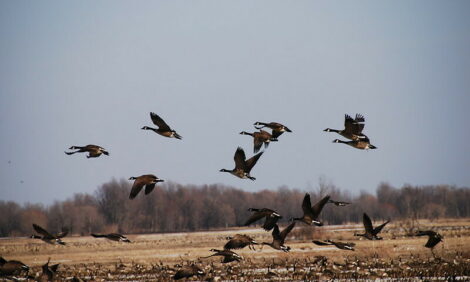



Multi-species study aids understanding of avian influenza
Response to infection in birds from chickens to crows points to biological factors linked to disease resistance.Investigations into how various bird species respond to avian influenza have enabled insights into the disease. The findings of a study conducted by scientists at the Roslin Institute point towards immune processes and key genes that may play a part in how various species respond to infection, according to a news release from the institution. Outcomes from the study may help inform development of commercial poultry that are resistant to the disease.
Researchers examined the response to mild and severe flu strains in six bird species – chicken and turkey, which are known to be susceptible to the disease, duck and crow, which tolerate and spread disease, and goose and pigeon, which are known to be highly resistant.
The team sought to pinpoint biological differences that affect the outcomes of infection.
In chickens and turkeys, exposure was found to lead to very high amounts of virus accumulating in several organs including the brain.
The study, which is the first to compare responses in the brain, suggests that this impact on the organ may be the cause of sickness and death from flu in these species.
Pigeons, which are resistant to infection, had low amounts of virus in their bodies and showed a low immune response following exposure to the flu, suggesting that they have an inherent ability to prevent virus from entering cells or spreading.
Researchers suggest that pigeons may be protected by having high levels of genes, known as interferon-stimulated genes, which are involved in immune response to infection.
The study identified other genes that may have a role in resistance, including several linked to the nervous system.
It also suggests that genetic differences may explain a variation in how ducks and crows, which typically show similar responses to infection, differ in their reaction to some types of severe flu.
Results also highlighted the benefits of a speedy innate immune response to infection, as delayed reactions tend to lead to worse outcomes.
The findings underscore previous studies that highlight the role of the brain and central nervous system in response to flu infections.
"Understanding the biological processes triggered by avian flu, and the factors that influence resistance, is important in the effort to limit the risk of bird flu in commercial poultry," said Dr. Katrina Morris of the Roslin Institute. "Our findings show that early interaction involving the immune system is key; they also highlight the importance of interplay between the birds’ nervous and immune systems in response to infectious disease, and flag several genes that may be influential in how infection plays out."
The study was published in Frontiers in Cellular and Infection Microbiology.










